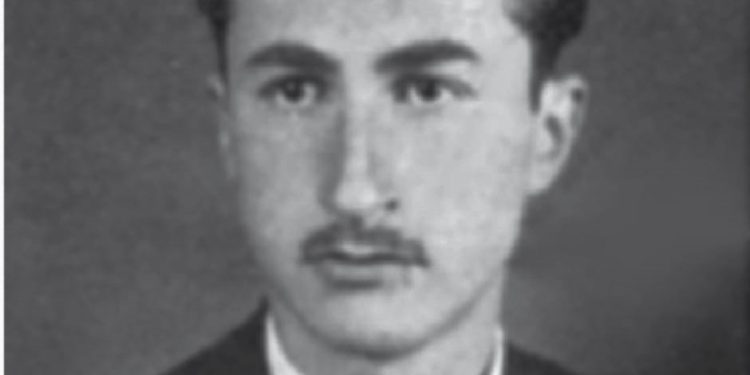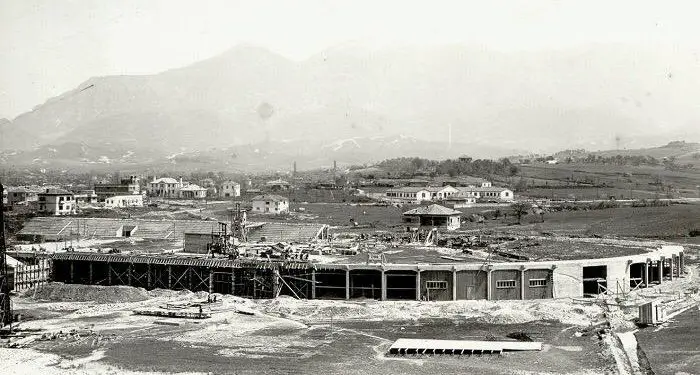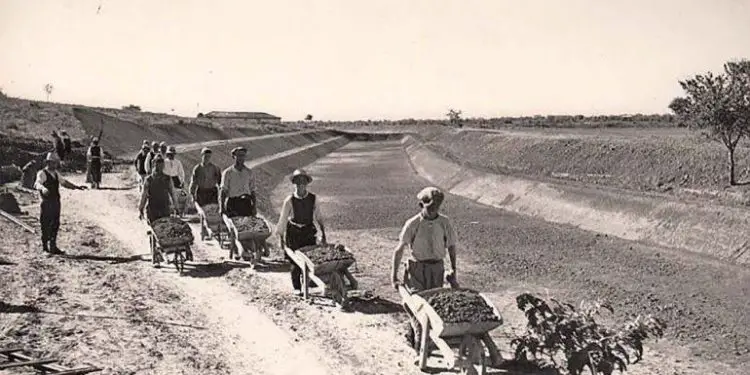By Ventigjar Hamzaraj
The first part
Memorie.al / Ventigjar Hamzaraj, was born in Vlora in 1923, in a family known for patriotic traditions. His father Myqeremi entered the history of Albania as a patriot, fighter and participant in the Vlora War in 1920. Ventigjar completed high school in Metz, France, and continued his high school for Civil Engineering in Italy, but could not finish due to the turmoil of the War. As the scion of a nationalist family, he was arrested shortly after the end of the war, because he was against the newly established communist regime, and in 1946 he was sentenced to 30 years in prison, of which he served 10 years. He spent his whole life in suffering and misery doing heavy manual work to support his family. Ventigjar Hamzaraj, who passed away in 1999, is considered one of the living legends of the anti-communist resistance in the prisons of Enver Hoxha’s dictatorship, and he left many manuscripts of historical value, mainly with events from the camps and political prisons of that regime.
DAMN BEDEN…!
The camp was built with barracks. Wooden posts embedded in the ground and lining with mats on the sides; while the cover was made with the sheets of different bitumen barrels. The length of the barracks varied from 40 m. up to 60 m. A narrow alley about 80 cm., served for passage. On both sides of this alley, two floors were built along the entire length of the shack and served as beds for sleeping. The height between these floors was such that you could not stand up, because you hit your head on the upper floor or on the sheets of the cover.
In those summer months, those sheets got so hot, as if they were a real oven. Personal needs were performed over an open pit, behind a shed. Several separate boards were laid over this pit, about two meters apart. You had to be very careful when walking on them, because they wobbled and were always wet with urine. If you break it, you fall straight into the faces. It was a jaw-dropping sight.
Initially, you felt a certain shame when you did your personal needs openly, in the presence of many people and many prisoners; they would take whatever they could find, any piece of paper or rag, to keep in front of their private parts. Over time, hunger, exhaustion to the core, extreme physical weakness, police beatings, made this shame no longer felt. Nothing impressed you anymore; suffering changed the nature of people. Little by little, a certain conviction was created that we had been brought there to die, so there was no longer any point in being ashamed.
Do corpses feel shame? It even happened to chat with each other while defecating, normally without making an impression. There you saw how people’s skin hung from weakness, especially those of more or less old age, their skin was less elastic, while in young people, this phenomenon did not happen even when they managed to become bones and skin.
The policemen who stood guard inside the camp were equipped with thick, knotted sticks instead of guns, and to amuse themselves, from time to time, they gave some elderly people who went to the needy a few blows. Of course, not all policemen practiced this method, there were those who did not beat, but they were rare, most of them were wild beasts. The barracks had only two narrow gates: one at the beginning for entry and another at the end for exit.
On either side of the gate’s exit, savages lurked and struck suddenly with clubs. To see how they squirmed, when they fell to the ground with a blow to the head, some unfortunate. They laughed and boasted to each other about these feats. One of those who suffered the worst, who beat him the most, was Razi Murati from Qishbardha in Vlora, who was called “Bej”.
The awakening took place when it began to dawn. No one was allowed to have a watch; no one was supposed to know what time it was. If you happened to ask a policeman, trouble started: “Why are you asking about the time?” What are you going to do? What will you find out? etc. And you could suffer badly. People began to orient themselves with the sun, and there were quite a few who came very close to the exact time, especially those who had been shepherds.
For a while in the morning they gave us a spoonful of warm water with a little sugar and they called it tea. Later, they took it away from us on the pretext that they would make halva with the sugar, when the 1st Congress of the Communist Party began. Since that spoonful of warm water was also removed, then immediately after waking up you would go to line up for two, in the work brigade where you were effective. Not everyone was quick to get dressed. For those who were late, the wood was always in action, both from the police and from the commanders of companies and brigades.
It was categorically forbidden to go from one silo to another or to communicate with other prisoners who did not belong to the squad or company to which you belonged. This was the order, but in fact it was difficult for the policemen or even for the spies to implement it because going to the common toilet, or going to or coming from work on a rainy day, the line was broken.
Even in the square in the middle of the camp, we could meet each other in passing for a few moments, enough to exchange two words. The work teams were mixed with political convicts and ordinary people. In each there had to be a command informer, who was generally imprisoned for ordinary offences. It rarely happened that even a political convict, someone ignorant and without character, performed this menial job.
In the team where I worked, there were also good people, such as Injac Serreqi and Karlo Suma, from Shkodra, Selaudin Peshkepia and Nazif Deromemaj from Vlora, Qamil Sefa from Lushnja, as well as some others whose names I do not remember, with whom you could talk something simple without fear. The commander of our brigade was an ordinary prisoner from Shkodra, his name was Xhevdet G. A very bad man, for a spoonful of soup he could do any kind of meanness.
One day this filth hit someone named Zef (I don’t remember the last name) and as he reacted, to Xhevdet’s aid, Captain Hodo Halimi, the guard of the Niazi brigade and filth from Vlora named Baçe J. came to Xhevdet’s aid. The four began to hit him with sticks; they broke his bones and knocked him to the ground.
Then they began to cover the excavated soil of the canal and laughed. It seems that Zefi had not lost his spirit and they enjoyed when he squirmed and moved the thrown soil. We watched from afar this scene of incomparable macabre, perpetrated by men of the most advanced order in the world.
Our hatred cannot be described when such acts took place: for the people who committed them and especially for those who ordered Enver Hoxha and Koçi Xoxe; as well as for their associates. During work, every two or three hours they gave us a ten-minute break, then lunch was brought with kettles, which were made of half barrels. The cooks who brought him near the workplace were prisoners. The meal was always soup: with rice, pasta or beans.
They rarely gave us any boiled bones, because the meat was eaten by the policemen, those who were commanders as well as the cooks who were all command informants. When the sun started to set, the work was stopped and we were taken back to the camp. How many hours did you work? We never found out. It lasted as long as there was light, 10 to 12 hours of exhausting work.
After returning to the camp, the assembly whistle was sounded. The commander of the camp, a man named Haxhi Pela from Roskovec, was chosen for this job because he was one of the cruelest and most ignorant. There was a hatred (perhaps a command) for intellectuals, especially for professors. When there was no water in the camp for the dinner soup, he shouted: “Professors in line”.
The desolate professors went and took the heavy metal drums that the U.N.RR.A. Had once brought with fuel, and accompanied by armed police, traveled several kilometers to fill them with water at a spring. My heart was dripping when I looked at my indomitable friend and comrade, Bego Gjonzeneli, with his small body, the kettle on his side after all that slave work he had done in the canal.
At these dinner gatherings, we were read from the newspaper, any article that the commander liked. After reading the paper, a prisoner Italian engineer named Ugo Monai read the daily output: how many cubic meters had been dug by each brigade. The whole camp was sitting on the ground.
After Ugo, the commanders of the brigades, who, as I said, were all, without exception, informers, they gave the names of the unfortunates who, according to them, did not work like the others, or who had said something during the work that the commanders did not understand liked. Woe to those who got a name for these things. The commander himself started the beating, and the police guards inside the camp continued, who also called the spies to help them. They were even more diligent in front of them. A real terror. Every day, every night, constant terror.
In the middle of the camp, two wooden poles were stuck to tie the prisoners by the hands and feet, a kind of crucifixion but with open legs. This punishment was used for those who were reported to the command for political conversations. Whoever was sentenced to be tied to the stake had a hard time escaping alive. In the camp, no meeting with family members, no food from outside was allowed. Nothing, except tobacco and a handful of salt, which the cooks were allowed to give us constantly.
The camp was surrounded by barbed wire up to 4 meters high and quite wide and complex. No one was supposed to approach the fence, near which, at a height of 2-3 meters, several small wooden signs were stuck indicating that you could approach them. If the sign was exceeded, the guards opened fire. Above the height of the barbed wire rose the wooden towers where the guards stood with machine guns and submachine guns, always ready to shoot.
Inside the camp, with barbed wire, they had surrounded a small area, where a tent was placed in the middle, for those isolated who were punished without bread. Haxhi Pela had imposed different punishments: beating in a tent, impaling or death. As he pleased, he was the god himself, the stick himself. They had given him a ‘white card’, for our lives. This cat one day managed to tell us: “Maybe you want to die, but we won’t let you go until you finish the canal, then we’ll settle accounts with you motherfuckers, enemies of the people”.
Think for a moment of our state of mind when we heard those insults from these heartless and unscrupulous ignoramuses and had no opportunity to respond. How did they choose those faces…?! One worse than the other. Almost all murderers and executioners, jobs they performed with great zeal and pleasure. Even wild beasts, when they are satiated, do not attack in vain, and these cannibals were never satisfied with the blood and suffering of political prisoners.
IN VLORA PRISON
By the end of the winter of 1951, I was in the flagstone room that is still in the corner of the old jail on the ground floor of the southern part. There, placed in two rows facing each other, were as far as I remember, Fatos Kokoshi, Izet Bushi, Ilmi Xhaferi, Pavllo Llazari, Simoli Koka, Gugo Dhrako, Shefqet Gjoleka, Shyqyri Allushi, Bexhet Shehu, Nysret Llupa, Shaqir Meta , Selman Beqiri, (from Velça) Islam P. and some others that I don’t remember, a total of about 17-18 people.
To pass the time, we occasionally played dominoes. Usually there were four of us: me, Shyqua, Bexheti and Ilmiu. Since we suspected an informant in the room, they did not hold political talks about the communists openly. One day while talking, I was afraid that we would not say things that could be reported by the spy we suspected, and I said to my friends: “We better go and play dominoes, because any word can escape us and they report us.” So we did, leave the chat and started the game.
After a few days on a cold January morning, the policeman calls me into the room and leads me to the bars of the big gate. There they tied my hands with irons and two policemen stabbed me in the building that was on the other side of the street (former property of the Xhyheri family) that served as their headquarters. They put me in a room where the Security Operative for the prison was, a lieutenant from the village of Libofshë in Lushnje, named Naun Tiko. After the police were told to leave, Nauni turned to me:
– You said: “Let’s move the dominoes so that we don’t say a word and they accuse us”.
– It’s not true, I didn’t say anything.
– Ah, dog, son of a dog, I’m going to call your… mother, but you didn’t tell me who you suspect.
– We do not suspect anyone; we are all condemned equally, for politics.
– Ah, vile enemy, you will tell me the man you suspect and whom you maskers call a spy or I will take his soul. Without telling me your name, you didn’t get out of here alive. He started to tighten the screw of the bars angrily. I felt a great pain in the bones of my hands and at the same time I felt that my strength was leaving me, I was fainting. When I came to, I felt Nauni kicking me in the ribs.
Meanwhile, he had loosened the bars a little. He led me to my feet and resumed the first questions. He wanted to know at all costs if we had discovered the spy. In fact, we were all guarded by Islam, who from time to time called him to the command, but I, as I said at the beginning, that I did not suspect anyone, I decided to keep that attitude until the end, rather out of anger, because in the end I could even tell him that I doubted Islam.
I felt myself weak, as one feels when one gets out of bed after an illness. I don’t know how long this investigator took on the first day. Finally Nauni called the cops and they put me in the dungeon under the stairs. It was a small, dark, musty dungeon. My hands hurt from the irons and I felt very cold.
When the prisoners were brought out into the courtyard according to the usual schedule, a roommate came to the gate secretly from the policeman and asked me why I was being tortured and if I needed anything. I told him the reason and asked him for some old newspaper and a match to make a little flame to warm my hands which were beginning to swell from the irons and the cold. I got a lot of old newspapers, which I started to light one after another throughout the night.
The rats, which had their own house, did not leave me alone, running through my legs and body. It was something disgusting. That’s how the first night passed. In the morning, when the doors of the upper rooms are opened to let the ordinary prisoners out into the yard, from the collision of their feet with wooden clogs on the rungs of the old wooden stairs, the dust shakes and with it a piece of cobweb falls on the head. Memorie.al
The next issue follows















